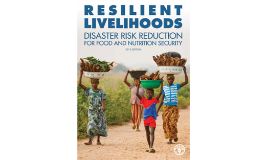Training course on Resilient Livelihoods
Training Course on Resilient Livelihoods equips professionals with the knowledge and tools to design, analyze, and implement sustainable livelihood interventions that can withstand and recover from adversities

Course Overview
Training course on Resilient Livelihoods
Introduction
The increasing frequency of global shocks, including climate change, economic disruptions, and conflicts, underscores the need for communities to adopt resilient livelihood strategies. Training Course on Resilient Livelihoods equips professionals with the knowledge and tools to design, analyze, and implement sustainable livelihood interventions that can withstand and recover from adversities. Whether addressing food security, income diversification, or resource management, this course offers practical insights for promoting long-term resilience in vulnerable communities.
Livelihood resilience is a cornerstone of sustainable development, empowering communities to adapt to changes while preserving their economic and social well-being. This course delves into frameworks, methodologies, and tools for assessing livelihood vulnerabilities and building adaptive capacities. Participants will explore real-world examples and best practices to understand how resilience can be strengthened across diverse contexts, including rural, urban, and disaster-prone regions. Organizations and practitioners often grapple with integrating resilience into livelihood programming. This course provides actionable strategies for assessing risks, designing interventions, and monitoring outcomes. By combining theoretical concepts with applied learning, participants will gain the confidence to implement projects that enhance community resilience while aligning with global development goals like the SDGs.
Course Duration
5 Days
Course Objectives
- Understand the concept of livelihood resilience and its relevance in development.
- Analyze risks and vulnerabilities affecting livelihoods in diverse contexts.
- Explore frameworks for designing resilient livelihood programs.
- Learn methods for data collection and analysis in livelihood assessments.
- Identify strategies for income diversification and resource optimization.
- Develop skills for integrating climate adaptation into livelihood planning.
- Address social, economic, and environmental factors in resilience building.
- Explore participatory tools for engaging communities in livelihood strategies.
- Monitor and evaluate the effectiveness of resilient livelihood programs.
- Gain insights from case studies on successful resilience-building interventions.
Organizational Benefits
- Enhanced capacity to design and implement resilient livelihood programs.
- Improved ability to assess and mitigate risks affecting target communities.
- Strengthened alignment with global development goals and donor priorities.
- Increased community trust and engagement through participatory approaches.
- Enhanced impact of programs through evidence-based decision-making.
- Diversified funding opportunities by showcasing resilience-focused initiatives.
- Improved staff skills in data collection, analysis, and project management.
- Effective use of resources to achieve sustainable outcomes.
- Better monitoring and evaluation for adaptive management of programs.
- Increased organizational credibility and influence in development spheres.
Target Participants
- Development practitioners and program managers
- Policymakers and government officials
- Researchers and academicians in development studies
- NGOs, humanitarian organizations, and community-based groups
- Climate change adaptation specialists
- Rural and urban planners
- Livelihood and food security advisors
- Social enterprise professionals
Course Outline
Module 1: Introduction to Resilient Livelihoods
- Overview of resilience and livelihood concepts.
- Importance of resilient livelihoods in sustainable development.
- Drivers of vulnerability in livelihoods.
- Global frameworks for resilience-building (e.g., SDGs).
- Case study: Livelihood resilience in post-disaster recovery.
Module 2: Livelihood Vulnerability and Risk Assessment
- Tools for assessing livelihood vulnerabilities.
- Identifying risks from environmental, social, and economic perspectives.
- Understanding community dynamics and capacity gaps.
- Prioritizing risks for intervention planning.
- Case study: Risk assessment in rural agricultural communities.
Module 3: Designing Resilient Livelihood Interventions
- Principles of resilient livelihood program design.
- Strategies for income diversification and resource optimization.
- Integrating climate-smart agriculture and adaptation.
- Policy and institutional support for resilience.
- Case study: Climate-resilient livelihood programs in arid regions.
Module 4: Participatory Approaches to Resilience Building
- Engaging communities in livelihood planning and implementation.
- Participatory tools like PRA and community mapping.
- Strengthening social cohesion and collective action.
- Gender and inclusion considerations in resilience planning.
- Case study: Community-driven livelihoods in conflict-affected areas.
Module 5: Data Collection in Resilience Planning
- Quantitative and qualitative data collection methods.
- Analyzing livelihood data for decision-making.
- Tools and technologies for monitoring livelihoods (e.g., GIS).
- Using data to prioritize and evaluate interventions.
- Case study: Data-driven resilience planning in urban slums.
Module 6: Monitoring, Evaluation, and Scaling of Resilient Livelihoods
- Designing M&E frameworks for resilience programs.
- Indicators of success in livelihood resilience.
- Adapting programs based on feedback and learning.
- Scaling successful interventions to broader contexts.
- Case study: Scaling resilience interventions in coastal communities.
Training Methodology
This course employs a participatory and hands-on approach to ensure practical learning, including:
- Interactive lectures and presentations.
- Group discussions and brainstorming sessions.
- Hands-on exercises using real-world datasets.
- Role-playing and scenario-based simulations.
- Analysis of case studies to bridge theory and practice.
- Peer-to-peer learning and networking.
- Expert-led Q&A sessions.
- Continuous feedback and personalized guidance.
Register as a group from 3 participants for a Discount
Send us an email: info@datastatresearch.org or call +254724527104
Certification
Upon successful completion of this training, participants will be issued with a globally- recognized certificate.
Tailor-Made Course
We also offer tailor-made courses based on your needs.
Key Notes
a. The participant must be conversant with English.
b. Upon completion of training the participant will be issued with an Authorized Training Certificate
c. Course duration is flexible and the contents can be modified to fit any number of days.
d. The course fee includes facilitation training materials, 2 coffee breaks, buffet lunch and A Certificate upon successful completion of Training.
e. One-year post-training support Consultation and Coaching provided after the course.
f. Payment should be done at least a week before commence of the training, to DATASTAT CONSULTANCY LTD account, as indicated in the invoice so as to enable us prepare better for you.